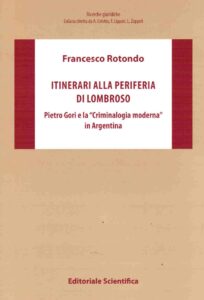 Francesco Rotondo, Itinerari alla periferia di Lombroso. Pietro Gori e la Criminalogia Moderna in Argentina, Editoriale Scientifica, Napoli, 2014.
Francesco Rotondo, Itinerari alla periferia di Lombroso. Pietro Gori e la Criminalogia Moderna in Argentina, Editoriale Scientifica, Napoli, 2014.
Abstract.
Since the 1870s, the “positive school” of criminology led by Lombroso, Ferri and Garofalo began to challenge the primacy in the Italian criminal law of distinguished jurists gathered around Francesco Carrara’s criminal-liberal legacy – the so called “classical school”. There are now numerous studies on the main theoretical features of the “positive school”, on its ability to affect the reform of Italian criminal law and on the international connections it was able to build. This paper investigates the echoes of the Italian positive school in Argentina through an analysis of the South American criminal context, deeply influenced by the European debate. In particular, it focuses on the itinerary of a “sui generis” criminal positivist: the Italian anarchist lawyer Pietro Gori. Exiled in Argentina from 1898 to 1902, he made a significant contribution to the debates around criminal law in that country also through the foundation of a particularly relevant and followed scientific journal: “Criminalogia Moderna”.